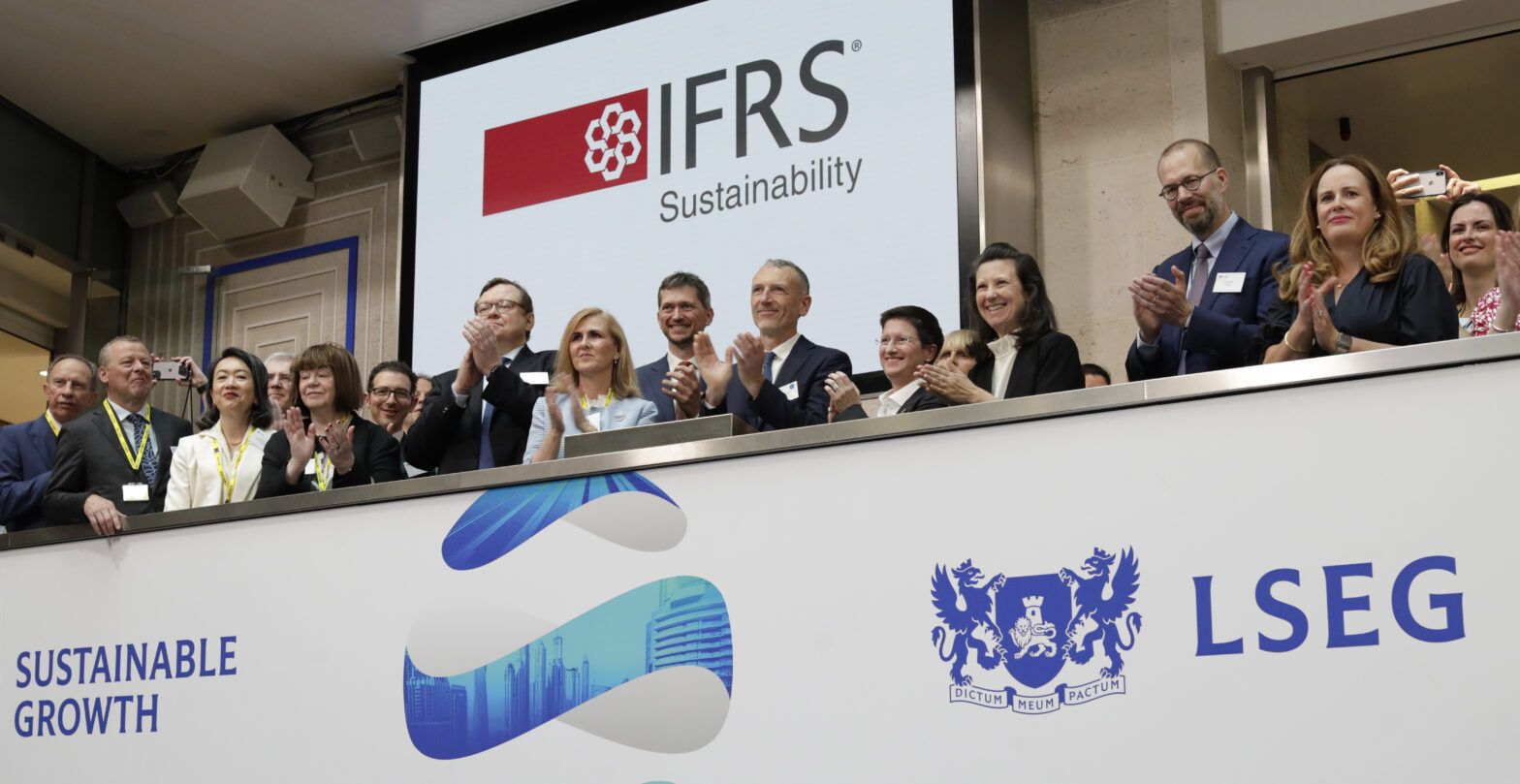The launch of the International Sustainability Standards Board (ISSB) S1 and S2 sustainability reporting standards today (26 June) has been called a “landmark day for the global economy and the financial sector” by Julia Hoggett, CEO of the London Stock Exchange Group.
IFRS S1 General Requirements for Disclosure of Sustainability-related Financial Information and IFRS S2 Climate-related Disclosures are the first two IFRS Sustainability Disclosure Standards developed by the ISSB, and serve as a comprehensive global baseline of sustainability disclosures for the capital markets.
IFRS S1 prescribes how companies prepare and report their sustainability-related financial disclosures. IFRS S2 sets out the requirements for companies to disclose information about their climate-related risks and opportunities, while building on the requirements in IFRS S1.
The standards affirm the value a company is creating is inextricably linked to its business ecosystems, the society with which it operates in, its business partners, and the natural capital it puts at work.
They will create a common language to express the risks and opportunities that are underlying this entire value system, beyond the limits of a single company, to its entire ecosystem.
They also require disclosure of the current and anticipated effects of sustainability risks, and opportunities on financial statements and the company’s prospects.
It is hoped the two new standards will help to improve trust and confidence in company disclosures about sustainability to inform investment decisions, and usher in a new era of sustainability-related disclosures in capital markets worldwide. IFRS S1 and IFRS S2 are effective for annual reporting periods beginning on or after 1 January 2024.
ISSB standards ‘horizon scanning’
Hoggett told the launch event kicking off London Climate Week: “Whether you’re a corporate financial institution, a government or a regulator, these standards can provide the foundation to advance our shared sustainability objectives.”
Providing complete and reliable information on climate and sustainability will enhance a company’s access to capital, Hoggett said.
She added: “At the London Stock Exchange, we embrace global frameworks for our issuers to disclose against, as this helps to maintain London’s position as a high quality and attractive international market to raise sustainable capital.”
The new ISSB standards build on the framework developed by the Taskforce on Climate-related Financial Disclosure (TCFD) and other international frameworks.
They have the potential to provide the international consistency that is needed to unlock comparable, actionable information to inform sustainability-related decision making.
Speaking at the event in London on 26 June, Emmanuel Faber, chair of the ISSB, said: “What we are doing here is bringing a solution that is an accounting-based language.
“It is not a suite of ESG metrics or disclosures. It is a comprehensive language which is deemed to be consistent, verifiable, and therefore decision useful.”
The ISSB’s objective is to “bring information that is useful to the primary users of general purpose financial reporting, when they’re considering providing resources to entities”, he said.
The scope of the new standards is not only the company, but the entire value chains of companies and businesses, Faber added, considering both short and mid term but also long term perspectives.
“Horizon scanning for sustainability risks and opportunities that may arise and impacts that could be decision-useful for investors and other capital providers, that is both the objective and the mission that we have set for ourselves,” Faber said.
Industry specific information
The London Stock Exchange Group said policymakers have a unique opportunity to accelerate progress on financial sector sustainability action by introducing mandatory disclosure rules for companies which adopt or align with the ISSB standards by 2025.
Sue Lloyd, vice chair of the ISSB, told delegates at the event a really important part of the ISSB standards is that they ask for industry specific information.
“And that’s because we know from our conversations with investors that when you understand sustainability related risks and opportunities, the way that that manifests really depends on the type of business that a company has undertaken and the activities that it’s involved in,” she said.
Corporate disclosure of sustainability-related information has proven a barrier for investors seeking to achieve sustainable investment objectives in recent years. Only 58% % of large- and mid-cap listed companies that are part of the FTSE All-World, report basic Scope 1 and 2 carbon emissions, according to London Stock Exchange data.
For the Russell 2000 which tracks US small-cap stocks, the figure drops to 10% and it is just 11% for constituents of the FTSE China A Share Index, which comprises companies listed in Shanghai or Shenzhen.
Lloyd added: “There was market demand to bring to an end the alphabet soup in the market and make sure that we had a system of reporting that really provided the information investors need to be confident to understand sustainability risks and opportunities are when they communicate with the market in an efficient way.”
She said: “We are talking about communication. And that’s what I talk about most when I talk about our new standards.
“We’re talking about standards that enable companies to communicate with investors so that investors can be confident they have the information they need to really understand the sustainability related risks and opportunities that companies are exposed to and the investment opportunities that are there.”
Steve Varley, global vice chair of sustainability at EY, commented: “The current global disparity in sustainability reporting makes clear our need for a common language and baseline for sustainability-focused disclosures, particularly regarding investments.
“Having worked with chief sustainability officers from around the world, both at EY and as co-chair of the S30, I’ve seen first-hand just how vital a harmonised approach is. The standards put forward by ISSB will give organisations freedom from ambiguity and opportunity to go further, faster.”





